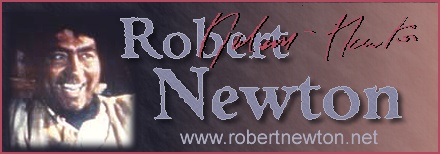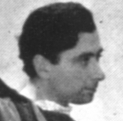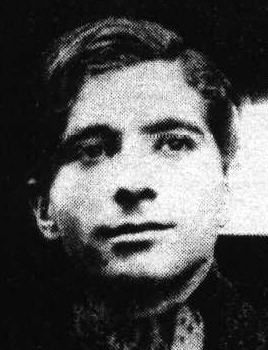![]()
![]()
![]()
Part
1
Part 2
![]()

![]()
![]()
![]() obert
Newton was born June 1, 1905, in Shaftesbury,
Dorset, England. The arts were in his blood: His mother was a writer,
and his father, Algernon
Newton (1880-1968), was a respected painter and member of the Royal
Academy. His great-grandfather, artist Henry Charles Newton, had co-founded
the Winsor & Newton art-supply
company. His brother and a sister were also painters (and his sisters
did some acting as well). His daughter Sally,
who died in November 2001, followed in her father's footsteps, becoming
an actress. His eldest son, Nicholas,
is a theatre producer in London's West End. And his youngest son, Kim,
is a photojournalist. Robert himself worked at various times as a scene
painter in the theatre and later portrayed an obsessed artist in the 1947
classic film Odd Man Out.
obert
Newton was born June 1, 1905, in Shaftesbury,
Dorset, England. The arts were in his blood: His mother was a writer,
and his father, Algernon
Newton (1880-1968), was a respected painter and member of the Royal
Academy. His great-grandfather, artist Henry Charles Newton, had co-founded
the Winsor & Newton art-supply
company. His brother and a sister were also painters (and his sisters
did some acting as well). His daughter Sally,
who died in November 2001, followed in her father's footsteps, becoming
an actress. His eldest son, Nicholas,
is a theatre producer in London's West End. And his youngest son, Kim,
is a photojournalist. Robert himself worked at various times as a scene
painter in the theatre and later portrayed an obsessed artist in the 1947
classic film Odd Man Out.
 After
attending school in Lamorna, near Penzance in Cornwall, and then Newbury
Grammar school, Newton was taken on as an assistant stage manager at the
enterprising Birmingham Repertory Company under Barry (later Sir) Jackson.
Within a few months in 1920, aged 15, he was thrust on stage in Bernard
Shaw's Captain Brassbound's Conversion. Over the next two years,
he painted sets, stage managed, understudied, and acted in over forty
plays in Birmingham and on tour. Weekly/fortnightly rep was to prove an
excellent training ground for his young talent. By 1923, in search of
wider horizons, he left England for South Africa on tour, and, in 1924
he got his first small West End part in London Life, a revue at Drury
Lane. It was not until 1928, however, when in Her Cardboard Lover,
starring Tallulah Bankhead, at that time a theatrical phenomenon, and
Leslie Howard, that he caught the eye of the new darling of London's West
End, NoŽl Coward.
After
attending school in Lamorna, near Penzance in Cornwall, and then Newbury
Grammar school, Newton was taken on as an assistant stage manager at the
enterprising Birmingham Repertory Company under Barry (later Sir) Jackson.
Within a few months in 1920, aged 15, he was thrust on stage in Bernard
Shaw's Captain Brassbound's Conversion. Over the next two years,
he painted sets, stage managed, understudied, and acted in over forty
plays in Birmingham and on tour. Weekly/fortnightly rep was to prove an
excellent training ground for his young talent. By 1923, in search of
wider horizons, he left England for South Africa on tour, and, in 1924
he got his first small West End part in London Life, a revue at Drury
Lane. It was not until 1928, however, when in Her Cardboard Lover,
starring Tallulah Bankhead, at that time a theatrical phenomenon, and
Leslie Howard, that he caught the eye of the new darling of London's West
End, NoŽl Coward.
Coward cast him in his triumphant musical revue, Bitter Sweet, which ran for over a year at Her Majesty's Theatre, and again, a year later in May 1931, he asked Newton to take over from Laurence Olivier in Private Lives in the New York production.
Before the run of Bitter Sweet he married, for the first time, Peta (short for Petronella) Walton. Their daughter, Sally, was born in 1930. Newton was to have two more children: Nicholas with Natalie Newhouse, his third wife, and Kim with his fourth wife, Vera Budnik.
In the summer of 1931, with the Depression forcing theatres to close, Newton found himself out of work with no money and working in New York's Hell's Kitchen. While waiting tables he ran into Lewis Milestone, famed director of All Quiet on the Western Front, and jumped at the offer to catch a ride with him to Hollywood. (At least he could look up Tallulah Bankhead even if, as it proved, there was no work for a "limey" actor out west.) Never short of a taste for adventure, Newton set off again, this time hitching north to British Columbia in Canada, and for the next few months took on the life of a cattle rancher.
Back in London in March 1932, he was on stage again in the West End with Ivor Novello, followed shortly afterwards by the long-running potboiler The Secret Woman. All the time he was working on his ambition of running a repertory theatre in London. The following year he achieved his dream as actor manager of the "Shilling Theatre" (so called because all seats were one shilling--10 cents in U.S. money) at the Fulham Palace Grand Theatre (since sadly pulled down). As in Birmingham 12 years earlier, Newton found himself acting, painting scenery, and also managing in fortnightly rep but this time sometimes with the help of his father, Algernon, who painted sets; mother, Marjorie, who wrote him a play; and sisters Joy and Pauline, who acted. The grand opening was in January 1933, when the theatre presented four short plays, including Eugene O'Neill's In the Zone. During the following two years he presented 31 plays, acting in nearly half of them. By the end of 1934, exhausted and very nearly broke, he went back to the West End. He was, by now, a stage star and there were plenty of offers.
 He
rounded off two further busy years in the West End by joining his friend,
Laurence Olivier, as Horatio to Olivier's Hamlet at the Old Vic Theatre
in January 1937--the production which brought Michael Redgrave and Alec
Guinness to public attention. From the end of its run, Newton was determined
to concentrate on his film career, although he did star again twice in
the West End--once during WWII in James Hadley Chase's No Orchids for
Miss Blandish, in the particularly lurid and vicious role of Slim
Grisson, and again in 1950 in the Victorian melodrama Gaslight.
His 17 years in the theatre had given him an uncanny knack for spotting
a good script and had perfected his wonderful sense of subtle, comic timing
and dramatic control that he was to use so effectively throughout his
film career.
He
rounded off two further busy years in the West End by joining his friend,
Laurence Olivier, as Horatio to Olivier's Hamlet at the Old Vic Theatre
in January 1937--the production which brought Michael Redgrave and Alec
Guinness to public attention. From the end of its run, Newton was determined
to concentrate on his film career, although he did star again twice in
the West End--once during WWII in James Hadley Chase's No Orchids for
Miss Blandish, in the particularly lurid and vicious role of Slim
Grisson, and again in 1950 in the Victorian melodrama Gaslight.
His 17 years in the theatre had given him an uncanny knack for spotting
a good script and had perfected his wonderful sense of subtle, comic timing
and dramatic control that he was to use so effectively throughout his
film career.
 One
of his earliest film roles was in a bit part in 1932's Reunion.
Then came a small but prominent role as Don Pedro, the Spanish villain,
in 1937's star-studded Fire Over England. He made four more
films that year and also worked on the never-completed epic I, Claudius
with Charles Laughton. Thereafter, he continued to work steadily in movies
and on the stage (and later on TV) for the rest of his life, except during
his four years of service aboard a minesweeper in
the British Navy during WWII. Even then, he was ocasionally given
special leave to work on select films, notably the patriotic Henry
V in 1944.
One
of his earliest film roles was in a bit part in 1932's Reunion.
Then came a small but prominent role as Don Pedro, the Spanish villain,
in 1937's star-studded Fire Over England. He made four more
films that year and also worked on the never-completed epic I, Claudius
with Charles Laughton. Thereafter, he continued to work steadily in movies
and on the stage (and later on TV) for the rest of his life, except during
his four years of service aboard a minesweeper in
the British Navy during WWII. Even then, he was ocasionally given
special leave to work on select films, notably the patriotic Henry
V in 1944.